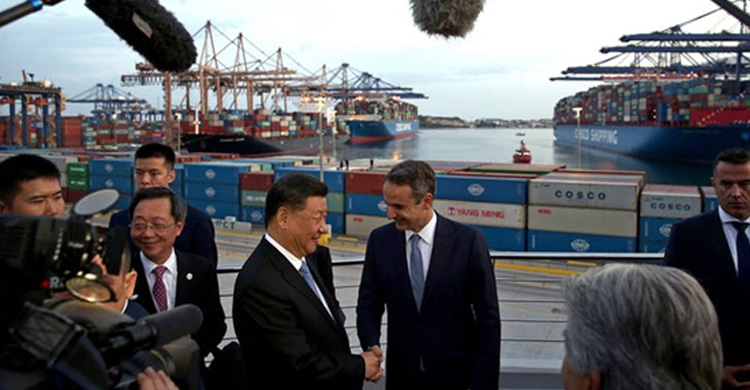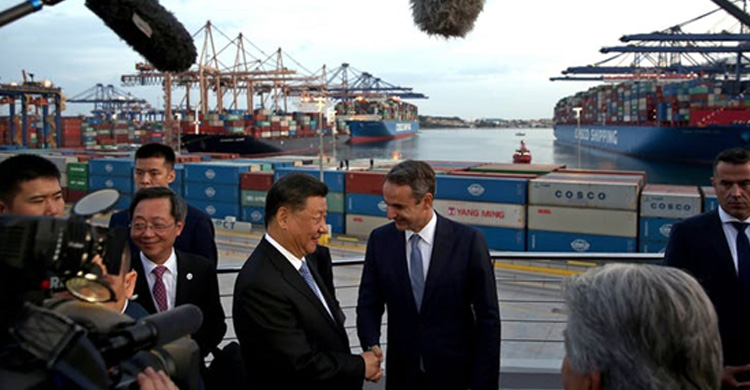

Source from The conversation
The eurozone has emerged from its debt crisis of 2010-18 intact, but at a very high cost to the periphery. Greece’s exit from its third bailout in August 2018, the swan song of the crisis, is perceived as successful only from a purely accounting perspective. Of the approximately €290 billion (£248 billion) lent to the country overall by the IMF, European Commission and European Central Bank, less than 12% was spent on investment.
The remainder has been used to service Greece’s spiraling national debt, and even then, repayments are only covered up to 2022. Thanks to the government spending cuts implemented from 2010-18 in return for these loans, unemployment is still running at 17%.
What timing for the Chinese president, Xi Jingping, to make his first official visit to Athens, intensifying a friendship between the two countries that has been developing for more than a decade. Earlier this year, Greece already became a member of China’s 17+1 initiative, which aims to deepen cooperation between Beijing and 17 states in central and Eastern Europe and the Balkans.
The initiative is part of China’s One Belt One Road project to develop connectivity and trade in Eurasia and beyond, to which the Greeks committed as far back as 2009 – the first developed economy and NATO member to do so. Greece has also unnerved its Western allies in the past couple of years by obstructing EU plans to condemn China over issues like human rights and the law of the sea.
To mark Xi Jinping’s visit to Athens, 16 new bilateral agreements were announced. They build on previous Chinese investments into Greek shipping, while also covering sectors as diverse as education and agriculture. This comes just two months after the Chinese president made a similar trip to Italy. That, too, saw the announcement of trade deals covering various sectors worth multiple billions of euros. The Italians also became the first major Western power to endorse One Belt One Road.
The Chinese alternative
The timing of these Italian and Greek announcements is not a coincidence. Italy, like Greece, is saddled with high debts and is bearing the brunt of the EU external migration crisis. Both countries had been calling on the EU for pan-European investment programmes for the past three years, but were rejected outright by core eurozone members like Germany, the Netherlands and Finland.
Greece and Italy are attempting the fine balancing act of dealing with China without undermining the EU’s overarching external trade policy, but the EU and Americans are still uneasy. The EU in particular is worried about China promoting its alternative model of governance without democracy.
In the case of the Greek announcement, one major concern is China’s involvement in the port of Piraeus via its state-owned China Ocean Shipping Corporation (COSCO). Though COSCO has taken stakes in at least 15 European ports in recent years, including the likes of Rotterdam, Antwerp and Marseilles, the port of Piraeus is a particularly eye-catching commitment.
Visiting Piraeus with Greek premier Kyriakos Mitsotakis.
The Chinese became the port’s majority owner in 2016, and had already committed €800m towards upgrading its facilities. Now there will be a further €600m investment. This aims to turn Piraeus into the biggest commercial port in Europe, while raising COSCO’s stake from 51% to 67% by 2022. The Chinese see Piraeus as a gateway to EU markets, with a strategic role in Asia-European-African trade routes thanks to its close proximity to the Suez Canal.
Greece’s participation in China’s 17+1 initiative is also viewed by the West as particularly significant. Greece is the biggest of the five eurozone members to have joined – the others are Slovenia, Estonia, Lithuania and Latvia. Membership is part of Greece’s broader plan to realise international trade agreements via new trade routes. The move seems to have rejuvenated an initiative which has been limited to upgrading infrastructure and had stalled since 2016.
While Greece initially joined 17+1 under its hard-left Syriza government, the fact that the new conservative government is prepared to upgrade strategic relations with China demonstrates that the relationship can survive political change in Athens. Xi Jinping’s visit came just a week after prime minister Kyriakos Mitsotakis visited Shanghai, after China made Greece the official guest country of the 2019 China International Import Expo.
The way ahead
In truth, it looks somewhat late for the EU to be concerned about these moves by Greece and Italy. They are the direct result of the strict bailouts and the eurozone’s refusal to invest seriously in either country. Other eurozone reforms that might help these countries – a eurozone fiscal union with an unemployment insurance programme; a eurozone banking union with a pan-European deposits guarantee scheme; a single European immigration policy – are also long overdue.
To make matters worse, eurozone growth rates have slowed considerably – led by Germany, the supposed powerhouse. France seems to be the only member yet to feel the impact of US tariffs, the Brexit process and the slowdown in the Chinese economy. The gloom is being exacerbated by the likes of the new fragmented European parliament and fragile Italian banks.
This all means that there is less room for manoeuvre than there might have been two or three years ago. So while the West may wish that its Mediterranean allies were not looking eastwards, it is going to be difficult to put this particular genie back inside its bottle. The growing sense in Rome and Athens that they have been abandoned by their allies will be difficult to reverse.
Share this post?
